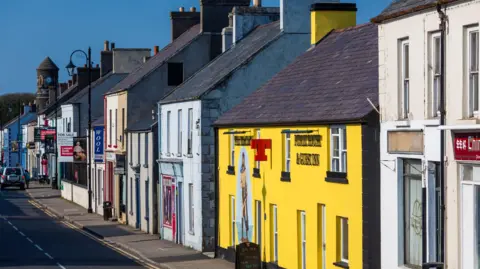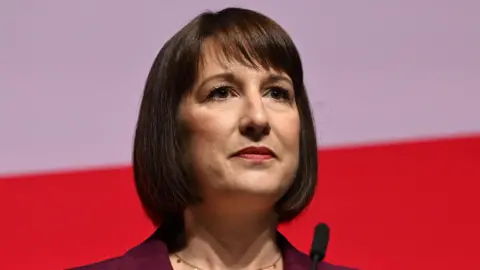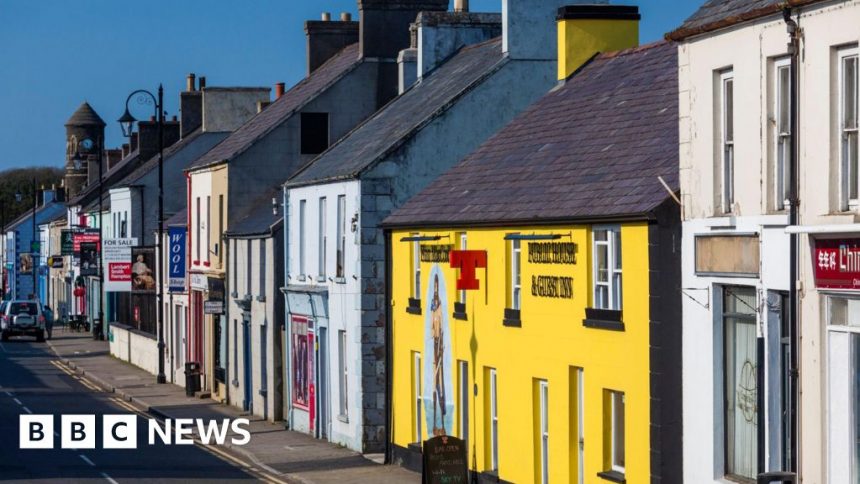Chancellor gives go ahead to NI growth deals
 Getty Images
Getty ImagesThe government is to proceed with Northern Ireland’s city and growth deals, the Chancellor Rachel Reeves has said.
Funding for the Causeway Coast and Mid South West deals was “paused” last month during a pre-budget spending review.
The chancellor confirmed the investment plans would go ahead as she delivered her budget – the first Autumn Statement from a Labour government in 14 years.
She also announced that the Northern Ireland Executive will receive an additional £1.5bn in funding next year as a result of her budget.
That consists of £1.2bn for day-to-day spending and £270m for infrastructure investment.
The government is also providing £45.8m in additional police and security spending and £730,000 to support schools as they work towards integrated status.
Stormont’s Department for Finance is expected to provide its analysis of the figures later.
What are city deals?

Delivering her budget in the Commons, Reeves said: “To support growth, including in our rural areas, we will proceed with City and Growth Deals in Northern Ireland – in Causeway Coast and Glens and the Mid South West.”
City deals – also known as growth deals in more rural areas – are regeneration funding packages worth more than £1.5bn, with about £600m coming from central government.
There are four deals in Northern Ireland: Belfast City region, Derry City and Strabane, Mid South West region, and Causeway Coast and Glens.
Stormont’s Finance Minister Caoimhe Archibald said it was “very welcome news” that the funding pause has now been lifted for the Causeway and Mid South West growth deals.
“These deals are a key driver to boost economic development and deliver regional balance and I am glad sense has prevailed,” she said.
The funding pause provoked outrage among Northern Ireland leaders last month with First Minister Michelle O’Neill describing the move at the time as “deplorable”.
The Labour government later said it would “continue to work closely” with the Stormont Executive on the deals.
More than expected for Stormont?
In respect of the extra £1.5bn for Stormont, the finance minister previous said she was expecting a much lower funding uplift of about £500m.
It is not uncommon for the Treasury and the devolved administrations to disagree about the real impact of a budget.
There is also a significant funding increase for the Northern Ireland Office, the UK department which is responsible for non-devolved issues in NI.
Its budget is due to increase from £52m this year to £62.3m next year.
The Treasury said this reflects funding required for for the Omagh Bombing Inquiry, the Pat Finucane Inquiry and other legacy issues.

Need to start ‘as soon as possible’
In a joint statement, teams working on the Mid South West Region and Causeway Coast and Glens deals welcomed the fact that the Chancellor has lifted the pause.
“This is a very positive outcome which means that we can move forward on the development of our key innovation, green energy and decarbonisation projects designed to boost the economy in these regions,” they said.
The proposed projects include a £22m centre for food and drug discovery (CFDD) in the Causeway Coast and Glens Borough Council area.
Among plans for the Mid South West region is the creation of an agri-food robotics automation packaging innovation centre.
The two teams said the deals have the “potential to create millions of pounds in return investment as well as thousands of jobs in these areas.”
Upper Bann MP Carla Lockhart said the deal would direct £126m to the Mid South West region, “covering Upper Bann, Mid Ulster, and Fermanagh and South Tyrone”.
“Further investment has been committed by the Executive, and this significant funding will help unlock the region’s economic potential by creating jobs, advancing key infrastructure projects, and driving economic growth,” she added.
Professor Liam Maguire is the Pro Vice-Chancellor for Research at Ulster University and sits on the board of three out of the four deals.
Speaking to BBC Radio Ulster’s Good Morning Ulster programme, he said these city deals would “improve economic growth and productivity”.
“These are really strong investment projects in local regions, and projects that have been decided by the local regions based on the strengths within those regions.
“It really does align in terms of what the government currently want to do so we would be really hopeful that they can be resumed and work can restart and we can progress these projects as soon as we can,” Prof Maguire said.
Chairman of the Mid South West Governance Steering Group Kevin Savage said the funding would be very important for the local economy.
“We’re talking about a package of £252m from central government as well as the Executive so we really need this £126m from Westminster to progress this, and that will leverage additional funds as well from the private sector.
What is included in the plans?
Projects in the Causeway Coast and Glens deal include:
- Centre for food and drug discovery at Ulster University Coleraine
- Innovation hub at North West Regional College, Limavady
- Dungiven and Bushmills regeneration
- Cushendall innovation centre
- Coleraine leisure and well-being centre
- Portrush to Bushmills greenway
Mid South West have not published an itemised list, but said their projects would focus on skills, innovation, infrastructure and the tourist economy.
Budget boost for police
Elsewhere in the budget, the Police Service of Northern Ireland (PSNI) will see a £7m rise in the amount of security funding it receives directly from the UK government annually.
The money helps tackle a national security threat posed by dissident republicans.
The budget will see this cash injection increase from £31m a year to £38m.
The chancellor also announced that the government will continue paying £8m towards the Stormont Executive’s tackling paramilitarism programme.
The PSNI gets the vast majority of its budget from the Department of Justice at Stormont.
‘Pretty difficult’

The chancellor’s budget announcement also included an increase in the National Minimum Wage and National Living Wage on Tuesday.
She also confirmed that employers’ National Insurance contributions will rise from 13.8% to 15%.
Steven Orr started his bagel business with his wife, Kirsty, about three years ago during pandemic.
They just opened their first store in Belfast city centre last week.
Mr Orr is worried the announcement could affect his hiring plans.
He said: “For most people in hospitality, employee costs is the biggest cost. Rent and electric are big but employee costs are the single biggest cost we pay.
“For a lot of us, we are either going to not hire new people, or try to do more in less time with the people that we have which is always pretty difficult when you’re busy anyway. “
‘It’s hard’
Mr Orr added: “We’re right beside the university here we’ve got lots of student employees so lowering the threshold means that what might have been a nice student part time worker, the costs are just going up to hire those people,” Mr Orr added.
He does not think employers should bear the brunt of the need for increased tax revenues.
“For the last few years, everyone has referred to the cost-of-living crisis, but it feels more like the cost-of-business crisis as it’s the businesses that have the increased wages, electricity on the commercial side went up so much more than the residential side, every ingredient has gone up.
“Then people complain when you have to put your prices up.
“It’s hard – we’ve only known it to be hard times over the last three years.”








